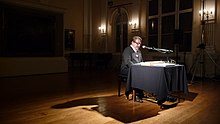Alexander García Düttmann
Alexander García Düttmann (* 1961 in Barcelona ) is a German philosopher and professor for philosophical aesthetics, art philosophy, cultural theory and art theory at the University of the Arts in Berlin . He studied in Frankfurt am Main and Paris and lived in London from 1993 to 2013. There he was most recently Professor of Philosophy and Visual Culture at Goldsmiths College London . He has also taught at Stanford University , University of Essex , Monash University , New York University , Middlesex University, and the Royal College of Art .
plant
In his work, Düttmann examines the relationship between language and history in thinkers such as Theodor W. Adorno , Walter Benjamin and Martin Heidegger . As followers on the one hand the critical theory of Adorno and also the deconstruction of Jacques Derrida (he has translated from French into German) include issues of political deconstruction - especially in the context of identity politics (AIDS activism, recognition, multiculturalism) - to his research interests.
In an explicit distinction from Hegel , he poses the question of the end of art differently and in relation to each individual work of art again and again: either as a possible completion of art - in the sense of a successful conclusion - or as its possible decline, in the sense of a definitive failure . In Verwisch die Traces he deplores the current fetishization of art and its reification into culture, thus a qualitative thinning in favor of an enormous quantitative presence.
In 2004 he contributed a libretto to the opera Liebeslied / My Suicides by the composer Paul Clark.
In his book on Luchino Visconti , he examines the films in the light of Adorno's view that it is never the real, but the possible that blocks the path to a utopia. The book is badly motivated, however, judges the critic of the Frankfurter Allgemeine Zeitung , Bert Rebhandl: "The real drawback of this book is that it never becomes clear why García Düttmann writes about Visconti."
Remarks
- ↑ With regard to his language, Doris Vera Hofmann questioned this self-assessment of Düttmann: "The style is leaden. Already a trace of Derrida's esprit, in whose tradition Alexander García Düttmann would like to see himself, could have breathed the life into the work that it only could in the language there. " (Review of Das Gedächtnis des Denkens. An attempt on Heidegger and Adorno , Frankfurter Allgemeine Zeitung , March 16, 1992, p. 28).
- ↑ Frankfurter Allgemeine Zeitung , January 25, 2008
literature
- 1989: La parole donnée, Paris: Galilée
- 1991: The memory of thought. Experiment via Heidegger and Adorno, Frankfurt a. M .: Suhrkamp
- 1993: At odds with AIDS, Frankfurt a. M .: Suhrkamp
- 1997: Between Cultures, Frankfurt a. M .: Suhrkamp (new edition 2002)
- 1999: Friends and Enemies, Vienna: Turia & Kant
- 2000: end of art. Three aesthetic studies, Frankfurt a. M .: Suhrkamp
- 2004: Philosophy of Exaggeration, Frankfurt a. M .: Suhrkamp
- 2004: That's it. A philosophical commentary on Adorno's 'Minima Moralia', Frankfurt a. M .: Suhrkamp
- 2005: Cover the tracks, Zurich / Berlin: diaphanes
- 2006: Visconti: Insights into Flesh and Blood. Insights into flesh and blood, Berlin: Kadmos
- 2008: Derrida and me. The problem of deconstruction, Bielefeld: transcript
- 2011: participation. Consciousness of appearance, Paderborn: Konstanz Univ. Press
- 2012: Naive Art. An attempt on happiness, Berlin: August-Verl.
- 2015: What does art know ?: For an aesthetic of resistance, Konstanz: Konstanz Univ. Press.
- 2016: Against self-preservation: Seriousness and lack of seriousness in thinking, Berlin: August Verlag.
- 2017: What is contemporary art ?, Konstanz: Konstanz Univ. Press.
Web links
- Literature by and about Alexander García Düttmann in the catalog of the German National Library
- Alexander García Düttmann on the website of the University of the Arts in Berlin
| personal data | |
|---|---|
| SURNAME | García Düttmann, Alexander |
| BRIEF DESCRIPTION | German philosopher |
| DATE OF BIRTH | 1961 |
| PLACE OF BIRTH | Barcelona |
